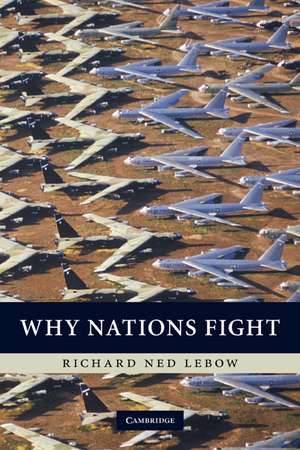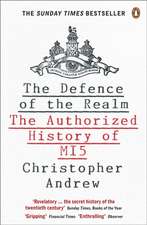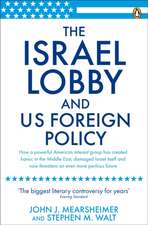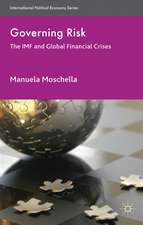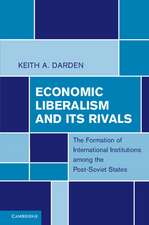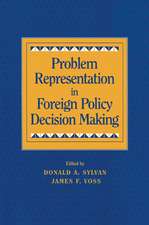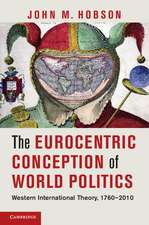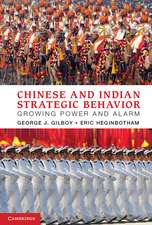Why Nations Fight: Past and Future Motives for War
Autor Richard Ned Lebowen Limba Engleză Paperback – sep 2010
| Toate formatele și edițiile | Preț | Express |
|---|---|---|
| Paperback (1) | 191.12 lei 3-5 săpt. | |
| Cambridge University Press – sep 2010 | 191.12 lei 3-5 săpt. | |
| Hardback (1) | 837.50 lei 6-8 săpt. | |
| Cambridge University Press – sep 2010 | 837.50 lei 6-8 săpt. |
Preț: 191.12 lei
Nou
Puncte Express: 287
Preț estimativ în valută:
36.58€ • 38.04$ • 30.20£
36.58€ • 38.04$ • 30.20£
Carte disponibilă
Livrare economică 25 martie-08 aprilie
Preluare comenzi: 021 569.72.76
Specificații
ISBN-13: 9780521170451
ISBN-10: 0521170451
Pagini: 318
Ilustrații: 11 b/w illus. 2 tables
Dimensiuni: 153 x 228 x 16 mm
Greutate: 0.5 kg
Editura: Cambridge University Press
Colecția Cambridge University Press
Locul publicării:Cambridge, United Kingdom
ISBN-10: 0521170451
Pagini: 318
Ilustrații: 11 b/w illus. 2 tables
Dimensiuni: 153 x 228 x 16 mm
Greutate: 0.5 kg
Editura: Cambridge University Press
Colecția Cambridge University Press
Locul publicării:Cambridge, United Kingdom
Cuprins
Part I. Introduction: 1. Introduction; 2. Theories of war; Part II. War in the Past: 3. Theory and propositions; 4. Data set and findings; Part III. War in the Future: 5. Interest and security; 6. Standing and revenge; Part IV. Conclusion: 7. Conclusion; Appendix: data set.
Recenzii
'Richard Ned Lebow makes an extremely successful attempt at broaching lucidly the main theories of war, and offers a most fascinating and convincing way of bringing them up to date. He strongly renews a classical field of IR studies by considering the new conflicts in a very relevant manner.' Bertrand Badie, Professor, Sciences Po, Paris
'In Why Nations Fight, Richard Ned Lebow makes a welcome contribution to the study of war by bringing motives and reasons (rather than just goals and intentions) back in. Extending his theory of human motives, he develops a typology of wars and establishes a series of propositions about war-initiation which he evaluates on a new historical data set. Last, but not least, he speculates on the future of wars by extrapolating from historical shifts in both the salience of motives and the changing understanding actors have of them.' Stefano Guzzini, Senior Researcher, Danish Institute for International Studies
'In Why Nations Fight Richard Ned Lebow continues the path-breaking attempt that he started in A Cultural Theory of International Relations to re-orient the way that we study international relations. In this new book he delivers on his promise to draw on systematic data to assess his theoretical analysis of war and, as a consequence, is able to reach some fascinating and broadly optimistic conclusions. Both his theory and evidence indicates that although one of the major reasons that states have gone to war in the past is to raise their international esteem, because of some complex social and cultural changes, war is now much less likely to achieve this goal. It follows that states are becoming much less motivated to go to war. This is a stimulating and challenging attack on orthodox thinking in the field.' Richard Little, University of Bristol
'… understanding why states enter into wars that have, in the last century alone, led to the collapse of empires, the subjugation of great powers and the destruction of man and his environment is essential, if only to mitigate the ruthlessness and danger and not to solve it. In this disciplinary and historical context, Richard Ned Lebow's Why Nations Fight: Past and Future Motives for War offers and argument that, if heeded, should teach theorists and practitioners of international affairs just how and why they continue to find themselves embroiled in conflict year after year. CEU Political Science Journal
'In Why Nations Fight, Richard Ned Lebow makes a welcome contribution to the study of war by bringing motives and reasons (rather than just goals and intentions) back in. Extending his theory of human motives, he develops a typology of wars and establishes a series of propositions about war-initiation which he evaluates on a new historical data set. Last, but not least, he speculates on the future of wars by extrapolating from historical shifts in both the salience of motives and the changing understanding actors have of them.' Stefano Guzzini, Senior Researcher, Danish Institute for International Studies
'In Why Nations Fight Richard Ned Lebow continues the path-breaking attempt that he started in A Cultural Theory of International Relations to re-orient the way that we study international relations. In this new book he delivers on his promise to draw on systematic data to assess his theoretical analysis of war and, as a consequence, is able to reach some fascinating and broadly optimistic conclusions. Both his theory and evidence indicates that although one of the major reasons that states have gone to war in the past is to raise their international esteem, because of some complex social and cultural changes, war is now much less likely to achieve this goal. It follows that states are becoming much less motivated to go to war. This is a stimulating and challenging attack on orthodox thinking in the field.' Richard Little, University of Bristol
'… understanding why states enter into wars that have, in the last century alone, led to the collapse of empires, the subjugation of great powers and the destruction of man and his environment is essential, if only to mitigate the ruthlessness and danger and not to solve it. In this disciplinary and historical context, Richard Ned Lebow's Why Nations Fight: Past and Future Motives for War offers and argument that, if heeded, should teach theorists and practitioners of international affairs just how and why they continue to find themselves embroiled in conflict year after year. CEU Political Science Journal
Notă biografică
Descriere
An explanation of the frequency of war and its specific causes and consequences, first published in 2010.
